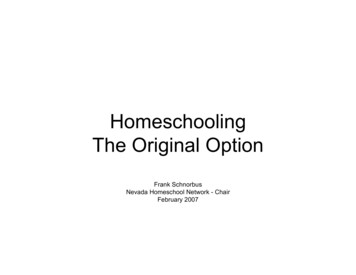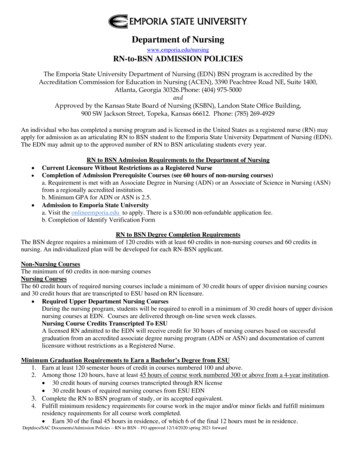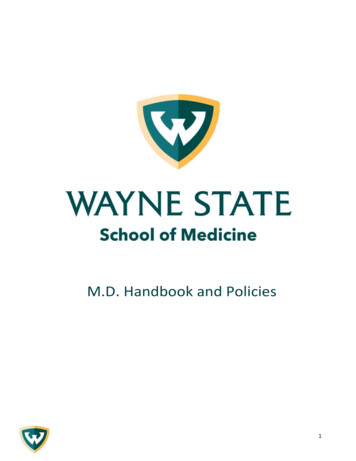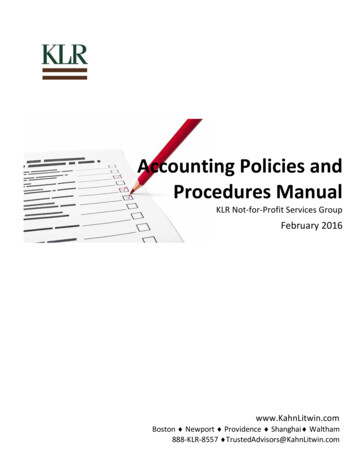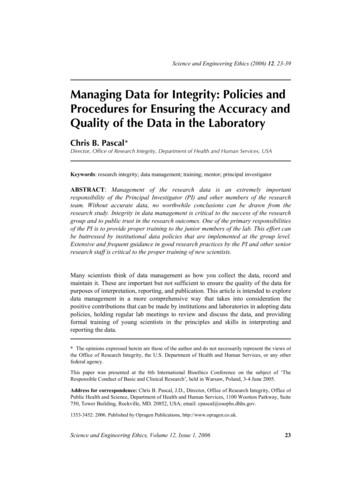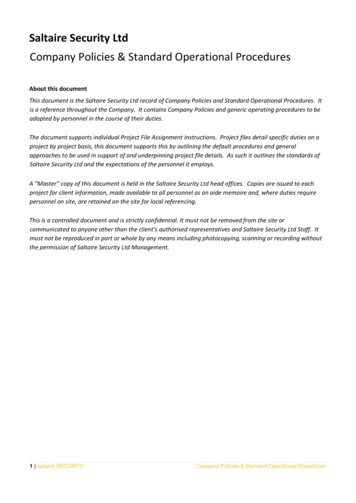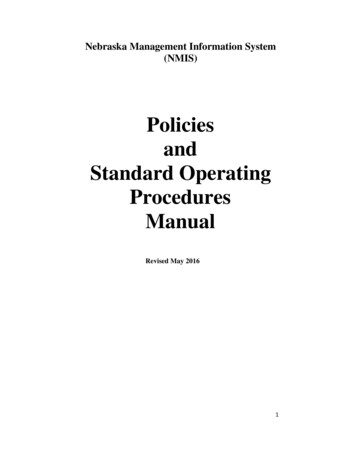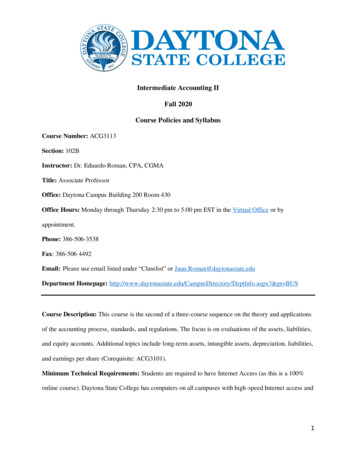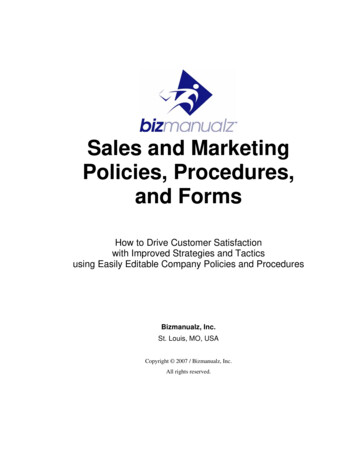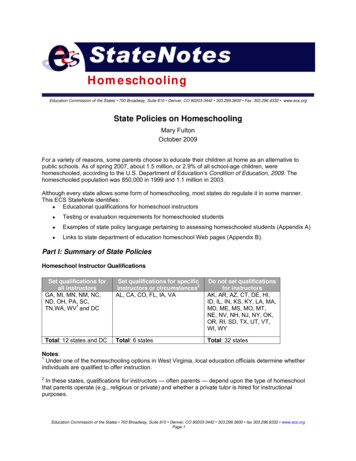
Transcription
HomeschoolingEducation Commission of the States 700 Broadway, Suite 810 Denver, CO 80203-3442 303.299.3600 Fax: 303.296.8332 www.ecs.orgState Policies on HomeschoolingMary FultonOctober 2009For a variety of reasons, some parents choose to educate their children at home as an alternative topublic schools. As of spring 2007, about 1.5 million, or 2.9% of all school-age children, werehomeschooled, according to the U.S. Department of Education’s Condition of Education, 2009. Thehomeschooled population was 850,000 in 1999 and 1.1 million in 2003.Although every state allows some form of homeschooling, most states do regulate it in some manner.This ECS StateNote identifies: Educational qualifications for homeschool instructors Testing or evaluation requirements for homeschooled students Examples of state policy language pertaining to assessing homeschooled students (Appendix A) Links to state department of education homeschool Web pages (Appendix B).Part I: Summary of State PoliciesHomeschool Instructor QualificationsSet qualifications forall instructorsGA, MI, MN, NM, NC,ND, OH, PA, SC,TN,WA, WV1 and DCSet qualifications for specificinstructors or circumstances2AL, CA, CO, FL, IA, VADo not set qualificationsfor instructorsAK, AR, AZ, CT, DE, HI,ID, IL, IN, KS, KY, LA, MA,MD, ME, MS, MO, MT,NE, NV, NH, NJ, NY, OK,OR, RI, SD, TX, UT, VT,WI, WYTotal: 12 states and DCTotal: 6 statesTotal: 32 statesNotes:1Under one of the homeschooling options in West Virginia, local education officials determine whetherindividuals are qualified to offer instruction.2In these states, qualifications for instructors — often parents — depend upon the type of homeschoolthat parents operate (e.g., religious or private) and whether a private tutor is hired for instructionalpurposes.Education Commission of the States 700 Broadway, Suite 810 Denver, CO 80203-3442 303.299.3600 fax 303.296.8332 www.ecs.orgPage 1
Student Testing and Evaluation RequirementsTwenty-two states and the District of Columbia require homeschooled children to be tested or evaluatedin some manner. Of these states — or under certain circumstances — 14 set a threshold for test scoresor require students to make “adequate progress.” Many of these states require parents to develop aremediation plan and/or prescribe an intervention if their children to not meet evaluation standards.NOTE: States marked with bold and italics (14 states) set a threshold for test scores or requirestudents to make “adequate progress.” See Appendix A for more details.Require student testingor evaluationAR, CO, GA, HI, IA, ME, MN,NH, NY, NC, ND, OH, OR, PA,SD, TN, VT, WA and DCTotal: 18 states and DCRequire student testing orevaluation under certaincircumstancesFL, SC, VA, WVTotal: 4 statesDo not require student testingor evaluationAK, AL, AZ, CA, CT, DE, ID, IL,IN, KS, KY, LA, MA, MD,MI, MS, MO, MT, NE, NV, NJ,NM, OK, RI, TX, UT, WI, WYTotal: 28 statesPart 2: State-by-State Homeschooling provisionsNOTE:* States that set qualifications for instructors only under certain homeschooling options or if a private tutor is hired forinstructional purposes.** States that require students to be tested or evaluated only under certain homeschooling options.STATEState policies affecting homeschoolingRequiresinstructors tohave highschooldiploma, GEDor otherqualificationsAlabamaAla. Code § 16-28-1(2) (definition of church schools)§ 16-28-3 (compulsory attendance and exemptions)§ 16-28-5 (certified private tutor)AlaskaAlaska Stat. § 14-30.010(b)(1)(C)(12) (compulsoryattendance exemption)ArizonaAriz. Rev. Stat. § 15-802 (homeschool)ArkansasArk. Code Ann. § 6-15-501-503§ 6-15-504 (testing requirements)CaliforniaCal. Educ. Code § 48222 (compulsory attendanceexemption for private schools)Cal. Educ. Code § 48224 (certified private tutor)X*ColoradoColo. Rev. Stat. § 22-33-104.5 (homeschooling)§ 22-33-104(2)(i) (compulsory attendance exemptionand private tutor)X*ConnecticutConn. Gen. Stat. § 10-184 (compulsory attendance)Requiresstandardizedtesting orevaluation ofstudentsX*XXEducation Commission of the States 700 Broadway, Suite 810 Denver, CO 80203-3442 303.299.3600 fax 303.296.8332 www.ecs.orgPage 2
STATEDelawareState policies affecting homeschoolingRequiresinstructors tohave highschooldiploma, GEDor otherqualificationsRequiresstandardizedtesting orevaluation ofstudentsCircular Letter from the Education Commissioner, #C,1994-95 Series, July 15, 1994 (Not available online;revised in 1990) (suggestions for homeschooling)Del. Code Ann. tit. 14 § 2703 (compulsory attendanceexemptions)14 § 2703A (homeschooling definition)District ofColumbiaD.C. Code Ann. § 38-202 (compulsory attendance)D.C. Mun. Regs. § 5200 (homeschooling)XXFloridaFla. Stat. Ann. § 1002.41 (homeschooling)§ 1002.43 (certified private tutor)§ 1003.01(13) (compulsory attendance)Ga. Code Ann. § 20-2-690(c) (homeschooling)X*X**XXGeorgiaHawaiiHaw. Rev. Stat. § 302A-1132(a)(5) (compulsoryattendance and exemptions)HAR Title 8-12-18 (testing requirements)HAR Title 8-12-19 (instructor qualifications)IdahoIdaho Code § 33-202 (compulsory attendance and“comparable” education)Illinois105 Ill. Comp. Stat. 5/26-1 (compulsory attendance)IndianaInd. Code § 20-33-2-4(2) (compulsory attendance)IowaIowa Code § 299.1 (compulsory attendance)§ 299.2 (compulsory attendance exemptions)§ 299A (certified private tutor and testing requirements)§ 281 IAC 31.2 – (certified private tutor requirements)Kan. Stat. Ann. § 72-1111 (compulsory attendance)KansasKentuckyKy. Rev. Stat. Ann. § 159.010 (compulsory attendance)§ 159.030 (compulsory attendance exemptions)LouisianaLa. Rev. Stat. Ann. § 17:236 (definition of school)§ 17:236.1 (homeschool approval and requirements)MaineMe. Rev. Stat. Ann. tit. 20-A § 5001-A Sub. 3A(compulsory attendance exemptions)20-A § 5001-A Sub. 3A(4) (homeschool and testingrequirements)MarylandMd. Code Ann. Educ. § 7-301(a) (compulsoryattendance)13A 10.01.01 (homeschool)Mass. Gen. Laws ch. 76, § 1 (compulsory attendanceand exemptions)MassachusettsXX*XXEducation Commission of the States 700 Broadway, Suite 810 Denver, CO 80203-3442 303.299.3600 fax 303.296.8332 www.ecs.orgPage 3
STATEState policies affecting homeschoolingRequiresinstructors tohave highschooldiploma, GEDor otherqualificationsRequiresstandardizedtesting orevaluation ofstudentsMichiganMich. Comp. Laws § 380.1561(3) (compulsoryattendance exemptions)§ 388.552 (private, denominational and parochialschools)XMinnesotaMinn. Stat. § 120A.22(10) (instructor qualifications)§ 120A.22(11) (testing requirements)XMississippiMiss. Code. Ann. § 37-13-91 (compulsory attendance)§ 37-13-91 (3)(c) (compulsory attendance exemptionsfor homeschool)MissouriMo. Rev. Stat. § 167.031 (compulsory attendance andexemptions; homeschool definition)MontanaMont. Code Ann. § 20-5-102(2)(e) (compulsoryattendance exemption)§ 20-5-109 and 111 (homeschool)NebraskaNeb. Rev. Stat. § 79-201 (compulsory attendance)§ 79-1601 (private, denominational and parochialschools)92 NAC 12 and 13 (school approval and accreditationexemptions)NevadaNev. Rev. Stat. § 392.070 (compulsory attendanceexemptions)§ 392.700 (homeschool)New HampshireN.H. Rev. Stat. Ann. § 193-A (homeschool)§ 193:1 (compulsory attendance and exemptions)New JerseyN.J. Stat. Ann. § 18A.38-25 (compulsory attendanceexemption)New MexicoN.M. Stat. Ann. § 22-1-2 (compulsory attendance)§ 22-1-2.1(c) (instructor qualifications)New YorkN.Y. Educ. Law § 3204 (compulsory attendance)Check format for Admin. CodeTitle 8 §100.10 (homeschool)North CarolinaN.C. Gen. Stat. § 39.115C-547-565(nonpublic/homeschool requirements, includingcompulsory attendance, testing and instructorqualifications)XXNorth DakotaN.D. Cent. Code§ 15.1-20-02 (compulsory attendance exemption)XXXXXXEducation Commission of the States 700 Broadway, Suite 810 Denver, CO 80203-3442 303.299.3600 fax 303.296.8332 www.ecs.orgPage 4
STATEState policies affecting homeschoolingRequiresinstructors tohave highschooldiploma, GEDor otherqualificationsRequiresstandardizedtesting orevaluation ofstudentsXX§ 15.1-23 (homeschool)§ 15.1-23-03 (instructor qualifications)§ 15.1-23-09 (testing requirements)OhioOhio Rev. Code Ann. § 3321.04(A)(2) (compulsoryattendance exemptions)Ohio Admin. Code § 3301-34-03(A)(9) (instructorqualifications)§ 3301-34-04 (testing requirements)§ 3301-34-05 (remediation)OklahomaOkla. Stat. tit. 70, § 10-105(A) (compulsory attendance)OregonOr. Rev. Stat. § 339.030(1) (compulsory attendanceexemptions)§ 339.035 (testing requirements)PennsylvaniaPa. Stat. Ann. tit. 24, § 13-1327 (compulsoryattendance)§ 13-1327.1 (homeschool)Rhode IslandR.I. Gen. Laws § 16-19-1 (compulsory attendance andexemptions)§ 16-19-2 (home and private school approval)South CarolinaS.C. Code Ann. § 59-65-40 (compulsory attendance)§ 59-65-40 (homeschool option, including instructorqualifications and testing requirements)§ 59-65-45 (alternative homeschool option)§ 59-65-47 (association for homeschools option)South DakotaS.D. Codified Laws § 13-27-2 (compulsory attendanceexemption)§ 13-27-3 (alternative instruction and testingrequirement)TennesseeTenn. Code Ann. § 49-6-3005 (compulsory attendanceexemptions)§ 49-6-3050 (homeschool)49-50-801 (church-related option)TexasTex. Educ. Code Ann. § 25.086(a)(1) (compulsoryattendance exemptions)UtahUtah Code Ann. § 53A-11-102(2) (compulsoryattendance and other requirements exemptions)VermontVt. Stat. Ann. tit. 16 § 166b (homeschool)16 § 1121 (compulsory attendance)XXXXX**XXXXEducation Commission of the States 700 Broadway, Suite 810 Denver, CO 80203-3442 303.299.3600 fax 303.296.8332 www.ecs.orgPage 5
STATEState policies affecting homeschoolingRequiresinstructors tohave highschooldiploma, GEDor otherqualificationsRequiresstandardizedtesting orevaluation ofstudentsVirginiaVa. Code Ann. § 22.1-254 (compulsory attendance andexemptions)§ 22.1-254.1 (homeschool)X*X**WashingtonWash. Rev. Code Ann. § 28A.200.010 (homeschooland testing requirements)§ 28A.225.010 (compulsory attendance exemptions)§ 28A.225.010(4) (instructor qualifications)XXWest VirginiaW.Va. Code § 18-8-1(c) (compulsory attendanceexemptions)§ 18-8-1(1) (homeschool approval option)§ 18-8-1(2) (homeschool notice of intent option,including instructor qualifications and testingrequirements)XX**WisconsinWis. Stat. § 115.001(3g) (homeschool definition)§ 118.15(4) (compulsory attendance exemption)§ 118.165(1) (private schools)WyomingWyo. Stat. Ann. § 21-4-102(b) (compulsory attendanceexemption and homeschool requirements)18 Statesand D.C.22 Statesand D.C.TotalsEducation Commission of the States 700 Broadway, Suite 810 Denver, CO 80203-3442 303.299.3600 fax 303.296.8332 www.ecs.orgPage 6
Appendix AState policy language pertaining to assessing homeschooled studentsThe following 14 states set a threshold for test scores or require students to make “adequate progress.”Many of these states require parents to develop a remediation plan and/or prescribe an intervention iftheir children to not meet evaluation standards.ColoradoHomeschooled students must be evaluated in grades 3, 5, 7, 9 and 11 and must show a composite scoreabove the 13th percentile. Students scoring below this threshold must enroll in a public or independent orparochial school until the next testing period. The students can avoid this intervention if they meet theachievement target by being retested using an alternate version of the same test or a different nationallystandardized exam.FloridaHomeschooled students must be evaluated on an annual basis. If students do not demonstrateeducational progress at a level commensurate with their ability, the parent has one year to provideremedial instruction. Continuation in a home education program is contingent upon the studentdemonstrating educational progress.The annual evaluation must consist of one of the following options:1. A certified teacher evaluates the student's educational progress upon review of a portfolio anddiscussion with the student.2. Students take any nationally-normed achievement test.3. Students take a state assessment test used by the local district.4. Students are evaluated by an individual holding a valid, active license.5. Students are evaluated with any other valid measurement tool as agreed upon by the local districtsuperintendent.NOTE: The testing/evaluation requirements apply only to certain homeschool options in Florida.HawaiiHomeschooled students must be tested in grades 3, 5, 8 and 10 with comparable exams used by thestate department of education. One of the following methods must demonstrate satisfactory progress:1. A test score that demonstrates grade-level achievement appropriate to the child's age2. Progress equivalent to one grade level per year3. A written evaluation by a certified teacher indicating that the student demonstrates appropriategrade-level achievement or significant annual advancement4. A written evaluation by the parent with a description of the child's progress.When standardized test scores are used, adequate progress will be considered to be in the upper twothirds of the score/stanines. If student progress is inadequate for two consecutive semesters, based ontest scores or the certified teacher’s evaluation, recommendations can be made to enroll the child in apublic or private school.IowaA homeschooled student must be evaluated annually using a nationally recognized standardized test orother assessment tool developed or recognized by the state department of education.Education Commission of the States 700 Broadway, Suite 810 Denver, CO 80203-3442 303.299.3600 fax 303.296.8332 www.ecs.orgPage 7
Adequate progress means an assessment score at or above the 30th percentile in each subject area, andmust indicate either that the student has made six months' progress from the previous evaluation or thatthe student is at or above grade level for the child's age.Students who do not make adequate progress must attend an accredited public or nonpublic school atthe beginning of the next school year. However, students can remain in homeschooling if they retake adifferent form of the same evaluation, or another evaluation and show adequate progress, or if approval isgranted to continue under a remediation plan.MinnesotaHomeschooled students must be assessed annually using a nationally norm-referenced standardizedexamination, agreed upon by the local superintendent and parents. If assessment results indicate that thechild's performance is at or below the 30th percentile or one grade level below the performance level forchildren of the same age, the student must be evaluated for learning problems.New HampshireParents must provide annual evaluations to ensure their homeschooled child's educational progress is ata level commensurate with the student’s age and ability. Evaluation options include the following:1. A certified teacher evaluates the student’s educational progress upon review of a portfolio anddiscussion with the parent or child.2. Students take any national achievement test and must score at or above the 40th percentile to bedeemed academically proficient.3. Students take a state assessment used by the resident district and must score at or above the40th percentile to be deemed academically proficient.4. Students are evaluated using any other valid measurement tool agreed upon by the parent andstate or local education officials.New YorkHomeschooled students must be assessed annually and receive a score at or above the 33rd percentileor have a score that reflects one academic year of growth. If test scores are inadequate, the program willbe placed on probation for up to two years and parents must submit a remediation plan.Alternatively, a certified teacher can prepare a written narrative to evaluate a student’s progress in grades1-3 and 4-8. This alternative only can be used every other school year in the upper grades. The evaluatormust certify that the student has made adequate progress, or the homeschool program will be placed onprobation and the parents must develop a remedial plan.The student must attain at least 75% of the objectives specified in the remediation plan — developedunder either option — at the end of any given semester, or 100% of the objectives at the end of the twoyear probation period.North DakotaHomeschooled students must take a standardized test in grades 4, 6, 8 and 10. If the student receives ascore below the 50th percentile, the parent must be monitored for at least one year and until the childreceives an adequate test score. A student scoring less than the 30th percentile must be assessed forpotential learning problems. The parents must prepare a remediation plan to address academicdeficiencies if the child is not found to have learning problems. The plan must remain in effect until thestudent achieves scores at or above the 30th percentile or demonstrates one year of academic progress.OhioParents of homeschooled children have three options for evaluating their child’s academic progress:1. Administer a nationally-normed standardized test. Students with a composite score at or abovethe 25th percentile will be deemed to be proficient.Education Commission of the States 700 Broadway, Suite 810 Denver, CO 80203-3442 303.299.3600 fax 303.296.8332 www.ecs.orgPage 8
2. Submit a written narrative indicating that a portfolio of work has been reviewed and that theacademic progress for the year is in accordance with the child’s abilities.3. Consult with the local superintendent to agree upon an alternative academic assessment of thechild’s proficiency.If academic assessments indicate the student is not demonstrating reasonable proficiency, parents mustsubmit a remediation plan. Remediation may be eliminated if the student demonstrates reasonableproficiency.OregonTesting is required for students in grades 3, 5, 8 and 10 and students must score at the 15th percentilebased on national norms. If lower, the child must be given an additional exam within one year. If thestudent scores continue to lag, the local superintendent may: allow the child to continue to be taught by aparent, legal guardian or private teacher; or place the child under the supervision of a person holding ateaching license.South CarolinaStudents must score at the promotion standard for one year prescribed for public school students by thestate board of education. Otherwise, district officials must decide whether or not the student shouldreceive placement in the public school, special education services or homeschooling with an instructionalsupport system.NOTE: The testing/evaluation requirements apply only to certain homeschool options in South Carolina.TennesseeHomeschooled students in grades 9-12 must take an annual standardized test or the state’s SandersModel of value-added assessment, whichever is in use in the local district. If the child fails, for twoconsecutive years, to meet or surpass the average level of achievement in the exams, the child mustenroll in a district, private or church-related school.Homeschooled students in grades 5, 7 and 9 must take the standardized tests required of public schoolstudents. The test for grade 9, however, cannot be the high school proficiency test. If students fall six tonine months behind their appropriate grade level, the parent must consult with a licensed teacher todesign a remedial course. If students fall more than one year behind, and if the child is not learningdisabled, local school officials may require the parents to enroll the child in a public, private or churchrelated school.VirginiaA homeschooled student must attain a composite score at or above the 23rd percentile on a nationallynormed standardized test or another approved evaluation that indicates the child is achieving anadequate level of educational growth and progress.If the student does not demonstrate adequate progress, the home instruction program may be placed onprobation for one year. Parents must subm
Mass. Gen. Laws ch. 76, § 1 (compulsory attendance and exemptions) Education Commission of the S
